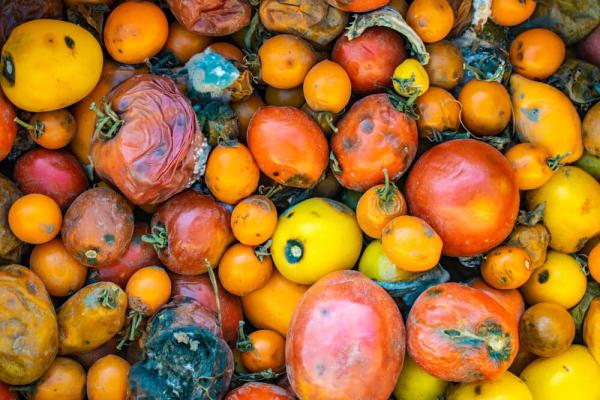I could smell the rot before the farm was even in sight. As someone taking a class at Princeton Seminary's “Farminary,” I was prepared to get my hands dirty. But this was different. As I drove up the winding gravel road toward the main barn, I found the source of the smell: three boxes elevated on pallets, each the size of a bathtub, filled to the brim with overripe, decomposing tomatoes which were baking in the September heat.
Our task for the day? Mixing these tomatoes with dead leaves and piles of brush, combining the flow of oxygen with carbon and nitrogen in order to turn decay and death into nutrients for new life. As I shoveled endless wheelbarrows of fly-infested tomatoes alongside my classmates, we reflected on where these three boxes of tomatoes came from and how they had come into our possession.
I live in New Jersey's Mercer County where food insecurity impacts nearly 40,000 people. These now-rotten tomatoes were once fresh and intended to feed people in need. However, when Hurricane Ida hit, delivery plans had to change. For many East Coast residents, the impact of Hurricane Ida was short-lived. Power outages were resolved quickly and roads were drained of floodwaters. But for marginalized, low-income, and food-insecure families, the lasting impact of the storm made traveling to attain food impossible.
When countless pounds of tomatoes rot in their crates while people nearby go hungry, who is to blame? Transporting the produce thousands of miles from Canada to Mercer County was not the issue. The issue is that the hurricane prevented people who desperately need resources from receiving them. And we know, in turn, that the hurricane is part of a deadly rise in severe weather that scientists and world leaders agree is "unequivocally caused by human activities," especially large corporations that profit from the destruction of God's creation. Given all this, I believe we as bearers and proclaimers of the gospel can help people ascertain resources while also mitigating climate disaster by caring for creation.
Despite the occasional claims of certain Christian pastors, we know disasters are not God’s judgment upon the earth. However, the Bible is clear that creation groans for a future restoration as forests and fields are subjected to the futility of human actions (Genesis 3; Romans 8:22). Instead of stewarding the land, many Christians in the West have colonized and conquered it, privatized and abused it. We have flippantly taken from the earth and given no nurture or care in return, our western colonial imaginations disciplining us to approach creation from a consumer perspective — leading us towards death with little hope for new life.
It is also clear that natural disasters disproportionately impact the marginalized and oppressed. U.S. theologian and biblical scholar Walter Brueggemann explains that when the powerful exert control over the environment, acting as though they are solely in charge of creation, the marginalized suffer the consequences. The Ten Commandments are not only concerned with humanity’s relationship to God and our relationship to one another but also humanity’s relationship to creation (Exodus 20, 23:9-12; Deuteronomy 5). This is most apparent in the commandment to “honor the Sabbath” as it points to how faithful stewardship over the dirt beneath our feet requires knowing when we must rest and when the creation must rest. When humanity refuses to allow creation to rest, the land becomes volatile and inhospitable which impacts the marginalized in a severe way. This is why Jesus preaches about both keeping the Sabbath and protecting the vulnerable (Mark 2:23-28, 3:1-6).
To borrow German theologian Karl Barth’s language, the goal of creation is to invite humanity into a covenant where we realize the sacredness of God’s creation which then inspires us to take care of the earth and all that dwell in it.
Throughout the Hebrew Bible, the land mourns, cries out, and vomits up those who abuse the land and the vulnerable (Leviticus 18:25; Job 31:38-40; Hosea 4:3). In the New Testament, we also see the ground shake and darkness consume Jerusalem at the moment of Jesus’ death a visceral response to the unjust treatment of the one who came to liberate the oppressed. U.S. theologian Willie James Jennings writes that we “have focused myopically on ecological concerns without thinking ecologically and holistically about the built environment in relation to racial and gender formation and multispecies connectivity and relationality.” In other words, it is right to focus on environmental care but, we also must take an intersectional approach when examining environmental disasters.
To repeat: When we do not take care of the earth and allow powerful individuals or companies to plunder the land God has called good (Genesis 1), the people who are disproportionately impacted are the marginalized. This discrepancy between those who benefit and those who suffer highlights the way our society is structured to benefit oppressors at the expense of people who are poor, hungry, and disenfranchised. The sin at the heart of systems and structures operative in the United States has rendered us guilty of abusing the environment which has led to further oppression of the vulnerable.
Yet even in crisis, I believe there is reason for hope. In Romans 8, Paul writes that the whole of creation groans together in the pains of childbirth as it awaits liberation and resurrection from bondage and corruption. The groaning of creation is a groaning of anticipation — a groaning toward new life.
Looking at land from this perspective helps us understand that both ecology and faith are deeply concerned with the processes of life and death, and life renewed. As Christians care for one another and the earth by creating sustainable food networks and developing healthy ecological practices, we acknowledge the reality of death while simultaneously cultivating new life that is personal, environmental, social, and systemic. Indeed, “if anyone is in Christ, there is a new creation: everything old has passed away…everything has become new” (2 Corinthians 5:17).
I believe God can be found in the dirt. God can be found in the mold and decay of rotting tomatoes and the trillions of bacteria that will turn rot into rich soil. As Barth hopefully imagines, creation is “the institution of the theatrum Dei gloriae, the ‘theater of God’s glory,’ the natural ground of redemption.”
As God continues in the restorative and redemptive work of turning death into life, new produce will grow from this “natural ground of redemption.” When this harvest comes, we will have systems in place to bring baskets overflowing with tomatoes to those who are in need.
Got something to say about what you're reading? We value your feedback!







